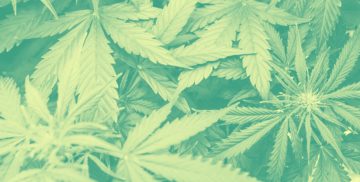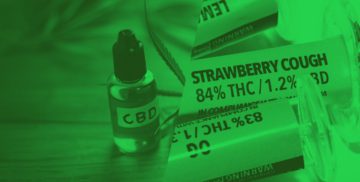A full breakdown of the law regarding CBD oil and its various products, including a timeline of cannabis legislation.
Cannabidiol, or CBD, is a compound found exclusively in the cannabis plant. In the UK, cannabis is illegal and yet CBD products are found in high street stores in every city and town across the nation.
The legislation surrounding CBD is scarce at best. It’s a quilt made of many shades of grey rather than black and white. The law is certainly in need of revising, but until parliament decides to do it, the laws we have are the laws we’ve got. We will endeavour to explain all aspects of current regulations, giving you a full breakdown of whether CBD is legal in the UK.
Understanding Cannabidiol
It’s everywhere these days; from coffee to lollipops to moisturisers and skin products. CBD is most definitely the flavour of the month, having risen into a billion-dollar industry worldwide in only a few years. But, what is CBD?
CBD is found within the cannabis plant and is extracted for the range of medicinal benefits that it provides. It belongs to a group of compounds, called cannabinoids, which are responsible for eliciting a wealth of different physiological effects on the body when ingested. Cannabinoids are responsible for memory, sleep, appetite and can also be used recreationally for their intoxicating effects.
But not all cannabinoids are created equal. There are over 100 found within the cannabis plant and they all have different effects and uses. CBD is generally extracted from hemp and then placed into a medium (such as an oil or vape liquid) to be consumed.
Ways to Take CBD Oil?
The phrase ‘CBD oil’ has become synonymous with CBD; but CBD doesn’t have to be an oil at all. There are multiple different ways in which it can be consumed, each with its own pros and cons, but generally, it is down to the preference of the individual. The popular ways in which CBD is more commonly consumed are:
Each of these different methods has different bioavailability (the amount of CBD that enters your bloodstream). These are listed in bold at the end of the description. No bioavailability is present for topicals because they aren’t ingested into the body
Vaporizers
A common method of consuming CBD is to vape an e-liquid that has CBD extracted into it. However, vaporizers can also be used to vaporize cannabis buds that contain CBD. (50-90%)
Tinctures
CBD can be extracted from the plant and placed into a carrier oil. This will usually be hemp oil, olive oil or MCT oil but could also be a variety of other things such as ethanol. These are consumed by using a dropper to place under the tongue. (60-90%)
Edibles
CBD is soluble in fats, such as butter or oil. It can be extracted into these and you can subsequently cook with them to make different foods and drinks that contain CBD. The most popular edibles are brownies, gummy sweets and lollipops. (5-20%)
Topicals
CBD can be extracted and placed into balms, lotions, salves and array of different beauty products that are applied directly to the skin.
Capsules
CBD that has already been extracted into oil can be placed into capsules for oral ingestion, similar to a cod liver oil supplement. They have similar effects to edibles, but without the extra calories. (5-20%)
Smoking
The traditional way of consuming cannabis. Buds that are high in CBD can be smoked either via wrapping it in a rizla or using a pipe/bong and inhaling the smoke after burning it. (50-90%)
Can CBD Get You High?
Cannabis has been popularised in modern culture as something used by stoners and hippies. However, as our understanding of cannabis develops, this misconception is being challenged. Cannabis is being seen in a much more positive light as a medicine and a supplement.
Not all the cannabinoids in cannabis are the same and only a handful of them have any intoxicating effects at all. The most common intoxicating cannabinoid is tetrahydrocannabinol (THC), famous for its strong mind-altering and psychoactive effects.
CBD, on the other hand, does not get you high. It is a non-intoxicating cannabinoid that may induce feelings of relaxation, but little more and certainly not enough to stop people from carrying out a normal day-to-day routine.
Scientists have figured out a way to separate and isolate CBD from THC, meaning that CBD on sale in the UK don’t contain THC, or at least not enough to elicit any sort of high for the user. What does the law say about CBD and THC?
Is CBD a Novel Food?
In order to understand the law about CBD in the UK, we must understand how CBD is classified and regulated in order for it to be sold in the UK.
EU legislation on CBD dictates that it must be extracted from industrial hemp produced by EU approved seeds. It can then be extracted and placed into legal products for human consumption that fall under the category of ‘novel foods’.
Novel Food Explained
A ‘novel food’ is defined as any food that had not been consumed prior to 15 May 1997. It must not pose a risk to public health, not be nutritionally deficient and must not be misleading to the consumer. In order to be classified as a novel food, an application must be made to the European Food Safety Authority (EFSA) who then performs a scientific risk assessment.
CBD Oil – Is It legal in the UK?
CBD is classified as a ‘novel food’ which is legally allowed to be sold in the UK. Products that contain CBD that fall under the scope of novel foods in the UK, are: –
- CBD oils, capsules and oral sprays;
- CBD coffee, beers, water and other drinks
- CBD gummies, lollipops, brownies and other foods
In order to put CBD into food, an application must be made to the EU for a licence. However, no licence is needed to import or sell CBD products in the UK. Under these definitions, we see no categorisation for products such as CBD buds/flowers, and even though they are commonly sold in the UK, they’re still prohibited products and illegal for sale.
Regulations of CBD Oils in the UK
The way in which the law is enforced in the UK is relatively relaxed, hence why there are so many unlicensed CBD products openly sold in the UK. However, this isn’t the case for all countries across Europe, who have the same regulations guidelines as the UK but decide to enforce them more thoroughly.
CBD regulations dictate the following: –
- CBD content must be clearly labelled;
- All manufacturer details and ingredients must be listed on the packaging;
- No medical claims must be made about the product;
- No THC must be in the product
As you can see there are very much defined guidelines for the sale of CBD in the UK and Europe.
Is Taking CBD Oil Safe?
CBD has been declared fit for human consumption by the World Health Organisation (WHO) with no potential for abuse or overdose. It is listed with several minor side-effects which may appear in a small number of users, including: –
- Changes in appetite
- Drowsiness
- Diarrhoea
- Nausea
People who consume CBD oil that have suffered these side-effects generally describe them as so minimal that it wouldn’t change the way in which they consume CBD. However, not all CBD products are of equal quality. The regulations surrounding CBD are very clear and concise for manufacturers, but this means nothing if they aren’t being enforced.
The CBD industry is currently suffering from people entering the industry with their own monetary gains at the heart of their business operation, not the wellbeing of their consumers. As such, products are being mislabelled and sold. Until the industry is better regulated, this will continue to happen.
The Timeline of Cannabis Law in the UK
Cannabis has been widely used by people for millennia as food, medicine, and building material. It is only within the last century that regulations surround cannabis have existed and been enforced on the population. The timeline of law within the UK is: –
- Dangerous Drugs Act (1928) – The first laws regarding possession of cannabis introduced to Britain.
- Drugs (Prevention of Misuse) Act (1967) – Recommendations were made to reduce the penalties on those in possession of cannabis for personal use.
- The Misuse of Drugs Act (1971) – Restrictions were placed on the cultivation of all species of cannabis.
- The Misuse of Drugs Regulations (2001) – New laws were introduced to permit cannabis cultivation under a special licence issued by the Home Office. Smoking of cannabis for research purposes was also permitted
- The Misuse of Drugs (Designation) (2015) – The first medical marijuana product begins production in the UK. Sativex is allowed for medical prescription with the approval of an application to an expert panel on a case-by-case basis.
- Medical Cannabis Legalisation (2018) – Revisions were made to The Misuse of Drugs which allowed cannabis to be prescribed in the UK without needing to apply to the special counsel. More cannabis-based medications enter the medical supply.
Legal Limit of THC
A common misconception surrounding the sale of legal CBD products is that if they contain trace amounts of THC (less than 0.2%) then they are allowed to be sold. However, this figure refers to how much THC is allowed to be present in the hemp grown.
The presence of THC is completely illegal in all CBD products in the UK and must not be detectable. The recommended detection limit for THC as provided by EU regulations for novel food products containing CBD is 0.01%. Any products must be below this to be legal.
Any businesses selling CBD are advised to ensure that any products they sell are completely free of any THC at all.
Key Takeaways
The law surrounding CBD products in the UK appears to be a grey area at first glance, unhelped by a relaxed outlook on these laws from UK authorities. This creates a problem for businesses who sell these products believing they are legal, when in fact they are not.
Reading the guidelines presented here should fully explain the law and remove any grey areas.



















